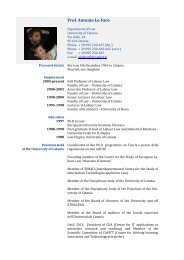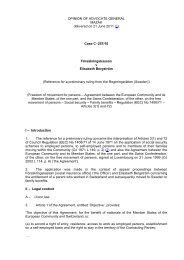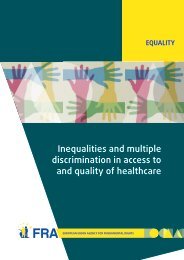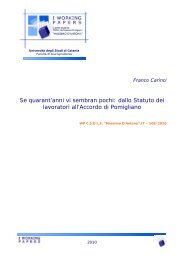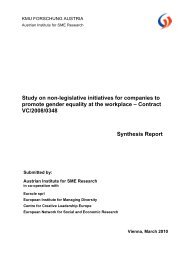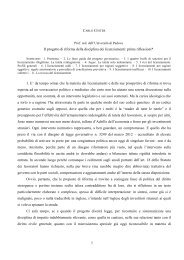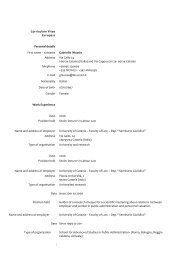Full text - European Trade Union Institute (ETUI)
Full text - European Trade Union Institute (ETUI)
Full text - European Trade Union Institute (ETUI)
Create successful ePaper yourself
Turn your PDF publications into a flip-book with our unique Google optimized e-Paper software.
Isabelle Schömann and Carolie Guedes<br />
fixed term duration employment relationship or a temporary employment relationship<br />
(Directive 91/383/EC of 25 June 1991 – OJL 206, 29/07.1991, p.19-12).<br />
Three years later, in its White paper (<strong>European</strong> Social Policy – a way forward<br />
for the <strong>Union</strong>, COM(94) 333, July 1994), the <strong>European</strong> Commission restated<br />
that regulating atypical work was one of the priorities of the Council. On 27<br />
September 1995 the <strong>European</strong> Commission set up a consultation of <strong>European</strong><br />
social partners in accordance with Article 3 of the Agreement on social policy,<br />
attached to Protocol no. 14 on social policy, enclosed in the Treaty instituting<br />
a <strong>European</strong> Community. The <strong>European</strong> social partners seemed ready to negotiate<br />
on the matter of equal treatment for atypical workers.<br />
Since then, many institutional changes have occurred. Indeed, since the entry<br />
into force of the Amsterdam Treaty, unanimity is no longer required in<br />
the Council, and consultation of <strong>European</strong> social partners has been institutionalised<br />
and enshrined in Articles 138 and 139 of the EC (now 154 and 155<br />
TFEU). As part of the policy of promoting the engagement of the <strong>European</strong><br />
social partners in the formulation of EU social policy, the EC Treaty (now<br />
the Treaty of the Functioning of the <strong>European</strong> <strong>Union</strong>) provides a procedure<br />
that combines the consultation of the social partners by the Commission with<br />
the option to leave social regulation to bipartite agreement between management<br />
and labour organised at <strong>European</strong> level. According to Article 154 TFEU,<br />
the Commission, before submitting proposals in the social policy field, has to<br />
consult management and labour on the possible direction of that Community<br />
action. Moreover, if, after such consultation, the Commission considers Community<br />
action advisable, it is obliged to consult management and labour on<br />
the content of the envisaged proposal. Therefore, the <strong>European</strong> Commission<br />
launched a consultation of the <strong>European</strong> social partners on part-time, fixedterm<br />
and temporary agency work. The <strong>European</strong> social partners, however, decided<br />
to tackle the three different issues in three different agreements, which<br />
led to two agreements on the first two issues, and in the preamble of both<br />
<strong>text</strong>s, the <strong>European</strong> social partners committed themselves to further negotiations<br />
on temporary agency work (recitals 12 and 13). Temporary agency<br />
work remained on the agenda while the ILO adopted Convention 181 on Private<br />
Employment Agencies, supplemented by Recommendation 188 in 1997.<br />
Temporary agency work appeared to be in deadlock at EU level. However, the<br />
need for a Community regulation was very strong, for three main reasons.<br />
First, temporary agency work is a growing sector in Europe which thus needs<br />
to be regulated at this level. Then, temporary agency work had already been<br />
regulated partly through two Directives (91/383/EEC health and safety for<br />
atypical workers and 96/71/EC on posting of workers in the framework of the<br />
provision of services). Finally, another incentive for reaching an agreement<br />
was the accession of many new Member States in May 2004. Indeed, the accession<br />
treaties limit the freedom of movement of workers coming from the<br />
new Member States, but usually these restrictions do not apply to the freedom<br />
of services. Thus, through the use of temporary agency work, new Member<br />
States can avoid the restrictions imposed on them by the accession treaties.<br />
It may have been a strong incentive for creating a regulatory framework for<br />
temporary agency work in old Member States (Bercusson 2008).<br />
12 Report 125




